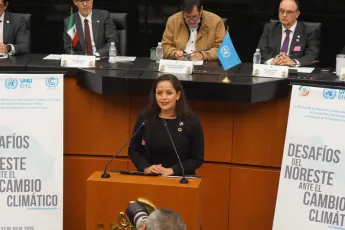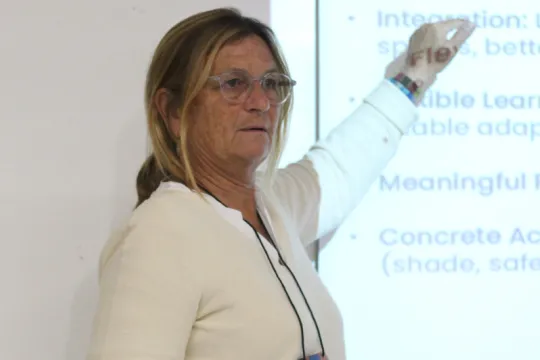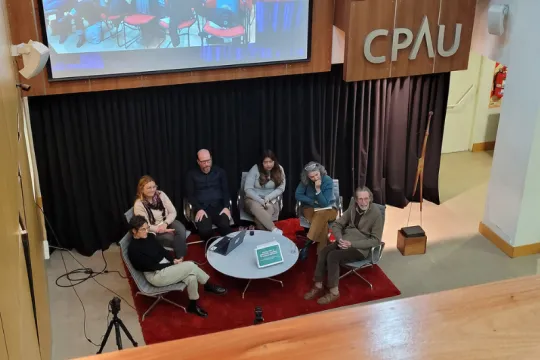
© UNU-EHS
UN Climate Change, United Nations University Institute for Environment and Human Security (UNU-EHS) and the Mexican Senator of Tamaulipas jointly organized a forum at the Mexican Senate to explore and discuss the “Challenges of the Northeast in the Face of Climate Change” (Desafíos del Noreste ante el Cambio Climático). Researchers involved with the IKI-funded project, Transformative Urban Coalitions (TUC), participated in the forum, which fostered a policy dialogue on the pressing climate-related challenges affecting the Northeast of Mexico. The forum served as a platform for knowledge exchange on the insights developed through the TUC project and how the TUC methodologies can be scaled-up to support urban transformations across this region. The forum was organized in the Mexican Senate and opened with remarks from Senator José Ramón Gómez Leal from Tamaulipas. Andrea Ramírez Agudelo, Senior Researcher at UNU-EHS, delivered a presentation on climate risks and urban resilience, followed by interventions from Andrea Hurtado, Director General of Climate Action Policies at SEMARNAT, and Alejandro Kilpatrick, Manager of the Capacity-building Subdivision at UN Climate Change. The opening session concluded with a message from Gerardo Fernández Noroña, President of the Mexican Senate.
The event featured three simultaneous thematic tables, where UNU-EHS researchers shared insights from the IKI-supported Transformative Urban Coalitions (TUC) project and discussed possible ways of scaling up the current project and transferring findings in support of municipalities in Northeast Mexico.
Thematic table 1: Water and the Water Crisis
This thematic table addressed the consequences of climate change on water availability, ecosystem degradation and pressure on shared watersheds. Legislators and local authorities from Tamaulipas, Coahuila and Nuevo León joined representatives from academia and public agencies to discuss water governance, soil conservation, pollution and the need for inter-institutional coordination. UNU-EHS emphasized the importance of public participation and evidence-based knowledge to enhance climate resilience and ensure equitable access to water resources. Lessons from the TUC project and its implementation in Naucalpan and León were presented as inputs for strengthening water governance and implementing ecosystem-based approaches.
Thematic table 2: Urbanization, Deforestation and Health
This thematic table focused on the effects of rapid urban growth and vegetation loss on public health and environmental sustainability in the Northeast. It included assessments of Nuevo León and Tamaulipas, institutional experiences in climate-focused urban planning at the regional level, and proposals for resilient urban planning policies. UNU-EHS presented three strategic mechanisms, taken from the lessons learned of the TUC project, to address the convergence of these challenges: i) Participatory urban governance to empower communities in shaping their environments; ii) Resilient infrastructure through demonstrative actions that can evolve into scalable models of urban transformation; iii) Shared visions of the future to align local and regional policies with national and international sustainability and climate agendas. These TUC-derived mechanisms reflect on the good practices captured by UNU-EHS and reinforce the commitment to fostering inclusive, evidence-based policymaking and promoting systemic change through collaboration.
Thematic table 3: International Cooperation and Institutional Capacities
This discussion explored the challenges and opportunities of international technical and financial cooperation to strengthen the institutional capacities of municipalities and state governments in the Northeast. Discussions focused on federal and international support mechanisms, common barriers to accessing climate finance, and experiences in building partnerships between local and global actors.
The dialogue represented a concrete step toward shifting these complex and interrelated challenges into opportunities for sustainable urban transformations for northeastern Mexico. UNU-EHS’s contributions not only stem from the ongoing work of the TUC project, which connects research, capacity development and public policy recommendations, but also highlight its potential for scaling up the lessons learned and the good practices. This effort consolidates evidence to support scalable, inclusive climate action, drawing on insights from León and Naucalpan. The project's long-term vision emphasizes collaborative systems and lifelong learning to promote urban transformations that enhance human well-being and protect the environment.
All contributions from UNU-EHS will be included in the forum’s official book of proceedings, to be published in coordination with the Senate Editorial Board after September 2025.

